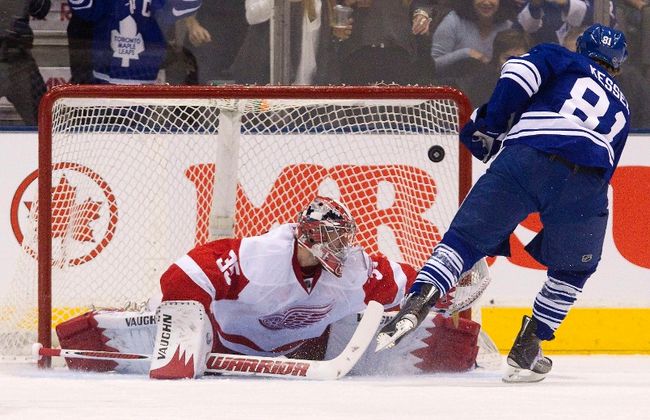The always tedious Hockey Night in Canada Hot Stove brought us a worthwhile nugget to examine this weekend, and that’s our first look at the proposed four new conferences that the NHL will be rolling out next season. Earlier in the week, both Darren Dreger and the more reliable Bob MacKenzie hinted that we are only a week or two away from this realignment being finalized, so we can assume this is pretty close to being set in stone:
| Conference #1 | Conference #2 | Conference #3 | Conference #4 |
| Carolina | Boston | Chicago | Anaheim |
| Columbus | Buffalo | Colorado | Calgary |
| New Jersey | Detroit | Dallas | Edmonton |
| NY Islanders | Florida | Minnesota | Los Angeles |
| NY Rangers | Montreal | Nashville | Phoenix |
| Philadelphia | Ottawa | St. Louis | San Jose |
| Pittsburgh | Tampa Bay | Winnipeg | Vancouver |
| Washington | Toronto |
Of course, we thought we might be close to a more simplified realignment last season, but that was promptly shot down by the NHLPA, with their primary concern being the inequity in playoff opportunities between the 8 team conferences and the 7 team conferences. With no real way of evenly dividing the teams into four conferences, that problem still persists. However, it may be regarded more as a temporary measure with the likely promise of expansion, and additionally there seems to be some consideration being given to wild card format to allow teams to play into the playoff bracket. I imagine this will be met by hatred of fans of teams in the fourth seed teams, but will generally be appreciated by anyone else who wants to watch meaningful hockey games.
The biggest shift from the previous alignment is the number of teams moving around the league. Previously the biggest shift was Winnipeg moving from the Southeast into what was best described as the Central conference, but with Columbus and Detroit making significant jumps into traditionally Eastern Conferences it now seems that more teams will be facing opposition that they aren’t overly familiar with than originally expected.
Arguably, these shifts are made more confusing because of the potential relocation of the Phoenix Coyotes, and the rumoured expansion to a 32 team league. If the Coyotes were to move to Seattle very little would change in this scenario, but if the move was to Quebec City, suddenly you have the Detroit bouncing back into the “Central” conference, and Colorado likely taking the 7th spot in the “Pacific.”
Expansion is even more dramatic. The assumption that expansion would likely be into Markham and Quebec means that the North East could be absorbing two additional teams. Then you’re again looking at Detroit getting the boot, and in all likelihood one of Boston (assuming they go to the Atlantic sparking another move), Buffalo, or the Maple Leafs also on the move. It made much more sense in the previous realignment when you had the flexibility for relocation and expansion existing in the East, and it seems odd that Detroit and Columbus would be approved for these unsustainable moves.
Realignment also certainly has benefit to the most important area in the leagues mind, and that’s revenue. Allowing Columbus to manufacture a rivalry with Pittsburgh will help their bottom line, allowing Florida and Tampa Bay to benefit from snowbirds attending their games could save those franchises from relocation, and with all four conferences promoting key rivalries it eliminates the risk of television networks getting stuck running Panthers vs. Penguins games for a lack of better programming options. The fact that the Pacific Conference almost guarantees that there will always be a late game on, it should give us all more games to watch and increase the amount of exposure.
Since this is a Leafs blog, it’s worth noting the impact on the team we hold so dear. At a first glance, I’d argue that this alignment increases the Leafs chances at leaping back into the playoffs. While the addition of Detroit may appear intimidating, it’s less so when you look at the rapid decline that they are experiencing in their post Lidstrom world. The conference has one juggernaut in the form of the Bruins, two clear basement dwellers in Florida and Buffalo, and then a pack of bubble teams making up the other five teams. In the current system, these teams would be victim to the four guaranteed contenders in the Atlantic, plus the South East division winner. With the Bruins also a playoff lock, these five teams would be competing for 2 playoff spots along with one of Carolina or Washington. Instead of six teams fighting for two spots, we’ve now been upgraded to five teams competing for three spots.
Here is a quick team by team look at the Winners and Losers of Realignment
Anaheim: Winners. They have stayed in a conference with their rivals, and two of the three teams added to their former division they have the potential to finish ahead of.
Boston: Winners. They are still the undisputed kings of the conference, and with an American Original Six team joining the mix it should allow Jeremy Jacobs to print more money.
Buffalo: Neither. In Buffalo’s position they’re likely going through a reboot no matter what the alignment is. Detroit a few more times a season should sell more tickets, but Pegula doesn’t seem to care too much about that.
Calgary: Losers. Adding in the Pacific teams makes the competition even tougher for a team that is pretending they don’t need to rebuild. It’s hard to imagine they won’t be finishing seventh for a long time.
Carolina: Losers. Despite the Staal vs. Staal rivalries with Pittsburgh and New York, this is a team that had a chance every season to make the playoffs being based in the South East, and now they’re buried behind the deep Atlantic teams.
Chicago: Winners. Losing Detroit as a rival sucks as this was one of the best in hockey, but looking at their very weak conference it’s hard not see the Blackhawks spending the next twenty years with a playoff berth.
Colorado: Losers. I’m sure they’d love to be in this Conference if Detroit was there and they could try to reignite that rivalry, but as it is they are a bad team getting stuck with one of the worst travel schedules.
Columbus: Losers. Congratulations to the Blue Jackets on playing against teams that they can sell tickets to. The downside is that they aren’t going to see the post season for a long, long time and will have to put up with Rick Nash lighting them up on a regular basis.
Dallas: Winners. This is a bit better for them as they no longer get stuck with a bunch of late games their fans have no interest in watching. They also could easily be the best of the bubble teams in a weaker division.
Detroit: Neither. They get what they want and will live in the Eastern time zone, but looking at the conference they are leaving behind, it seems like they are giving up a lot of wins to do so.
Edmonton: Losers. The division just got a whole lot tougher than just having to beat Vancouver. They haven’t exactly dominated the California teams this season.
Florida: Winners. Is it more important to make the playoffs or not go bankrupt? Probably the latter, so with Boston, Montreal, and Toronto fans buying more tickets they’ll like this set up.
Los Angeles: Winners. Edmonton and Calgary aren’t much of threat to them yet, and Vancouver brings another rivalry into their conference.
Minnesota: Winners. They’ve got a friendly time zone, a chance to cultivate rivalries with Chicago, Dallas, and Winnipeg, and they’re much more of a bubble team in this weak conference as opposed to the current 15-team format.
Montreal: Neither. I really don’t think they care as long as they get to stay with Boston and Toronto. If Price keeps up his play they still are one of the stronger bubble teams in this conference.
Nashville: Losers. Detroit was a big draw for them and Winnipeg, Minnesota, and Dallas are unlikely to replace that. They are still likely a playoff team in this new set up, though.
New Jersey: Winners. They get a bit more of a cushion to make the playoffs with weaker South East teams and Columbus joining the conference. None of the Atlantic rivalries are sacrificed either, which should ensure strong gate numbers for them.
New York Islanders: Neither. Fighting their way past Washington and Carolina to get near the playoffs doesn’t help them, but it will be nice to be cushioned from the basement by the Blue Jackets.
New York Rangers: Winners. Not a whole lot of new competition for them entering the conference, but really not much impact from their current situation.
Ottawa: Losers. Try as they might to be considered rivals of the Leafs and Canadiens, they are now further down the totem pole with another Original Six team in the mix. It seemed impossible for people to care less about them, but here we are.
Philadelphia: Winners. Not that much really changes for them, but if the conferences were drawn purely by geography the Flyers would have been pulled away from some rivals. I wouldn’t doubt that Ed Snider is one of the main reasons that two Florida teams are playing with the North East.
Phoenix: ???. If they stay in Phoenix this has to be a win since they get some Canadian snowbird traffic. Fewer games against the Red Wings probably upsets the fan base a little, and with Vancouver coming into the conference it’s tougher to grab that fourth spot. If they move, they’ll probably trigger a number of upset teams unless they are Seattle bound. They’re the biggest wildcard in the realignment plan.
Pittsburgh: Winners. The made up rivalry with the Caps equals a ton of TV time and tickets sold. With the Blue Jackets desperate to make them rivals, they should reap some rewards from that. The fact that they’re unquestionably one of the teams to beat doesn’t hurt them either.
St. Louis: Winners. Taking Detroit out of the picture makes them the 1B team to Chicago’s 1A. I’m sure they’ll miss their Central Division rivals, but the fact that they can make easy work of newbies Minnesota and Winnipeg will help them get over it.
San Jose: Losers. The Sharks are a team that is due to start a sharp decline and is in a conference with teams like Edmonton, Phoenix and Anaheim, all more than happy to put them out of the playoffs.
Tampa Bay: Losers. They had a much better shot at the playoffs in the South East. They’ll get a ticket sale boost, but not as noticeable as their cross state rivals, and theirs is likely coming at the cost of playoff games.
Toronto: Winners. I’ll go with winners by a marginal amount as they will inherit the Wings as rivals, and being 4th out of 8 seems somewhat more manageable than 8th out of 15 for some reason.
Vancouver: Losers. The Canucks will now play a higher number of games against real competition. Their days of steamrolling the Wild and Avs are over, and with the Oilers improving, it looks like the Flames are the only whipping boys in a tough Pacific.
Washington: Winners. Their team is about to get worse, and they’d be wise to rebuild, but if they hang on to Ovechkin they’ll still have no problem selling their fan base on an increased number of Ovechkin vs. Crosby games, even if they are the only ones who still care.
Winnipeg: Losers. Sure, their crazy travel days are over. Sure, they’re still in one of the softer conferences. But as soft as the Central is, maybe it’s still tougher than they are used to in the South East, and I’m sure they would have preferred to be West with the other Canadian teams than forced to latch onto the Wild as their rival.
Monday Morning Links…
Leafs Asset Management and Ryan O’Reilly
Gus Katsaros has the most thorough take on the challenges in trading for O’Reilly. An offer sheet is still the easiest option and you can always deal players to recoup picks if that’s your concern.
Leafs lose in Ottawa but the bigger story could well be Brian Burke going to Buffalo as Sabres GM—a la Punch Imlach forty years ago…
The first of three posts from Vintage Leaf Memories today, Michael takes a look at the historical parallels if Burke were to manage the Sabres. It would be entertaining to watch the Sabres head further down the Ott and Scott rabbit hole.
Leaf Matters Podcast with Damien Cox
I haven’t had a chance to listen to this yet, but I’m interested in hearing how Cox acts on a podcast.
Our Maple Leafs: the weaknesses have not been exposed…yet
The final Vintage Leaf Memories post is a must read. Michael has balanced look at how the Leafs have done so far and where things could potentially go wrong.
Riemer close to returning to lineup
Just a quick note from TSN, but certainly a good sign as he’s much more reliable than Scrivens.
Carlyle takes blame for loss to the Senators (Sportsnet)
Now if we can get him to apologize for his lineup decisions we should be able to move forward.
Don Cherry wants more toughness out of Carl Gunnarsson (CBC)
Yep, the guy who has decided to put off hip surgery for a couple of months and instead is choosing to play through the pain isn’t tough. Also, if Cherry doesn’t think Mike Brown is the right guy to stand up for his teammates, what does he see as Brown’s role on the Leafs?
Before I Made It: Mark Fraser
Mark Fraser talks to the Hockey News about his life before professional hockey.
Jonathan Drouin is just basically messing with people now (Backhand Shelf)
If this season goes off the rails, here’s your reminder that Drouin isn’t a bad consolation prize.
Here’s your awful HFBoards Kessel trade of the week.
Sigh. If it was just Simmonds for Gunnarsson I’d be intrigued, except it’s hard to make a case for adding more wingers.

































![Sheldon Keefe Post Game, Leafs 3 vs. Bruins 2: “I loved [the Matthews] line, and I loved a lot about our game all the way through the lineup” Sheldon Keefe, Toronto Maple Leafs post game](https://mapleleafshotstove.com/wp-content/uploads/2024/04/keefe-pg-game-1-100x70.jpg)

